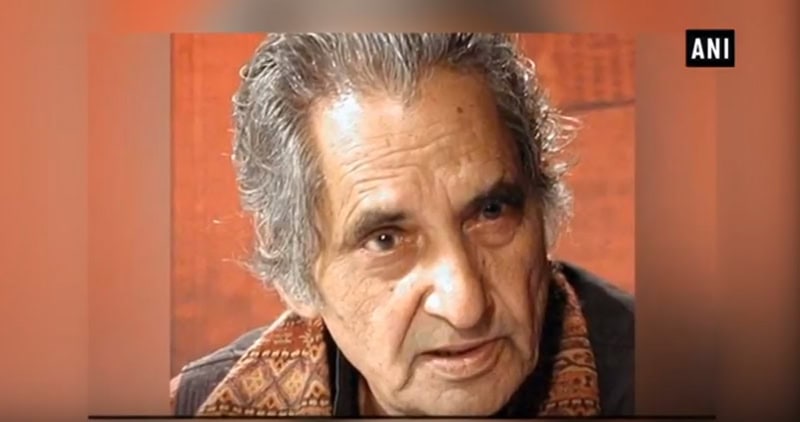MUMBAI:
Ab toh mazhab koi aisa bhi chalaya jaaye / Jisme insaan ko insaan banaya jaaye…
Aag behti hai yahan, Ganga mein bhi Jhelum mein bhi / Koi batlaaye kahan jaa ke nahaya jaaya / Ab toh mazhab koi aisa bhi chalaya jaaye…
Doyen of Hindi poetry and legendary lyricist Gopal Das ‘Neeraj’ passed away at the All-India Medical Institute of Medical Science (AIIMS) in New Delhi on Thursday. He was 94.
He had been suffering from many old age-related ailments for the past few years and was shifted from Agra to the pulmonary department of AIIMS on Wednesday after he developed respiratory complications, a family member informed.
Shashank Prabhakar, son of Neeraj, told reporters in the national capital that the body of the late poet would be first taken to Agra for people to pay their last respects and after that it would be taken to Aligarh where the last rites would be performed.
Neeraj was born in Etawah district of Uttar Pradesh on January 4, 1924 and has endeared generations with his soulful poems and lyrics. Many of his books and compositions won acclaim from his followers world over.
His main compositions include Prangeet, Vibhawari, Antardhwani and Sangharsh, among others. He was honoured with the coveted Padma Shri in 1991 and the Padma Bhushan in 2007. The Uttar Pradesh government had bestowed on him the Yash Bharti award in 1994.
Renowned Urdu poet Rahat Indori described Neeraj as a “secular poet”. “Neeraj was not only a secular Indian, but also a secular poet.”
Well known poet-lyricist Javed Akhtar described him a poet of “Hindustani” who ruled the hearts of millions for almost seven decades.
“He was both a shaayar of Hindi and a kavi of Urdu and in that sense a true legatee of the Ganga-Jamni tehzeeb of this land. In a field where you are only as good as your last composition, it is really not easy for someone to rule the hearts of millions for over seventy years. His contribution and his works are immortal and can never be forgotten,” he said and added, “And the single biggest thing about his poetry was accessibility. You don’t need to be a great literature buff to get his words. They are so simple and in the language of the common man. But they never fail to make their mark on the heart.”
Bharat Ratna nightingale Lata Mangeshkar who has sung several songs (including Apne Hothon Ki Bansi Bana Le Mujhe, Rangeela Re, Khilte Hain Gul Yahaan, Shokhiyon Mein Ghola Jaaye) penned by the lyricist has said:
“I’m quite pained to hear of the demise of Neerajji. I feel fortunate I was able to sing so many of his songs which are well recieved even today by listeners. I offer my shraddhanjali and pray that his soul rests in peace.”
For his lyrics in Bollywood films, he won three back to back Filmfare awards in the 70s — for “Kal ka pahiya ghoome re bhaiyya…” from the film “Chanda Aur Bijli” in 1970, “Bas yahi apradh main har baar karta hoon, aadmi hoon aadmi se par karta hoon…” from film “Pehchaan” in 1971 and “Ai bhai, zara dekh ke chalo…” from film “Mera Naam Joker” in 1972.
Expressing his condolences, UP Chief Minister Yogi Adityanath said the death of legendary poet is an irreparable loss. He also announced institution of an annual award in the memory of late poet, to be given away to five young poets. The award would carry a cash prize of Rs one lakh and a citation.
UP Governor Ram Naik also mourned his death, while Samajwadi Party (SP) chief Akhilesh Yadav has described the demise of Neeraj as an irreparable loss.
The state government has announced that the last rites of the poet would be held with full state honours.
Ab to Mazhab koi aisa bhi chalaaya jaaye, jismein insan ko insan banaya jaaye. This was so apt for today’s politics.

Neeraj wrote powerful Kaarwan guzar gaya, ghubaar dekhte rahe for Nayi Umr ki Nayi Fasal sung in great way by Muhammad Rafi. The song became legendary.

IANS inputs

